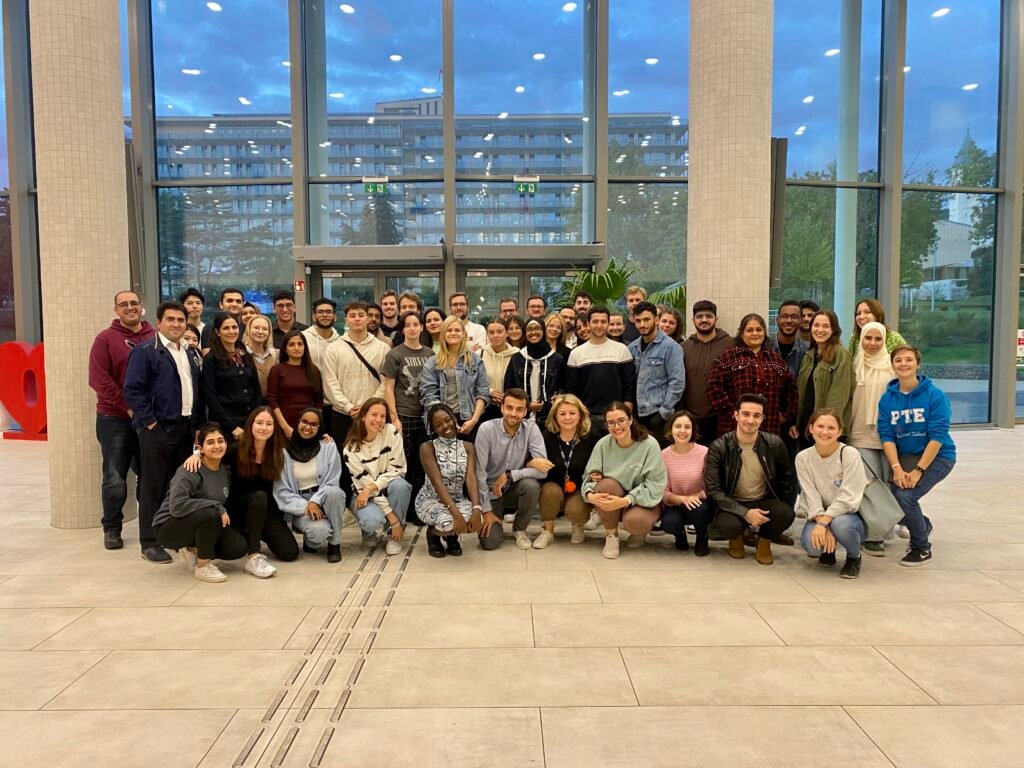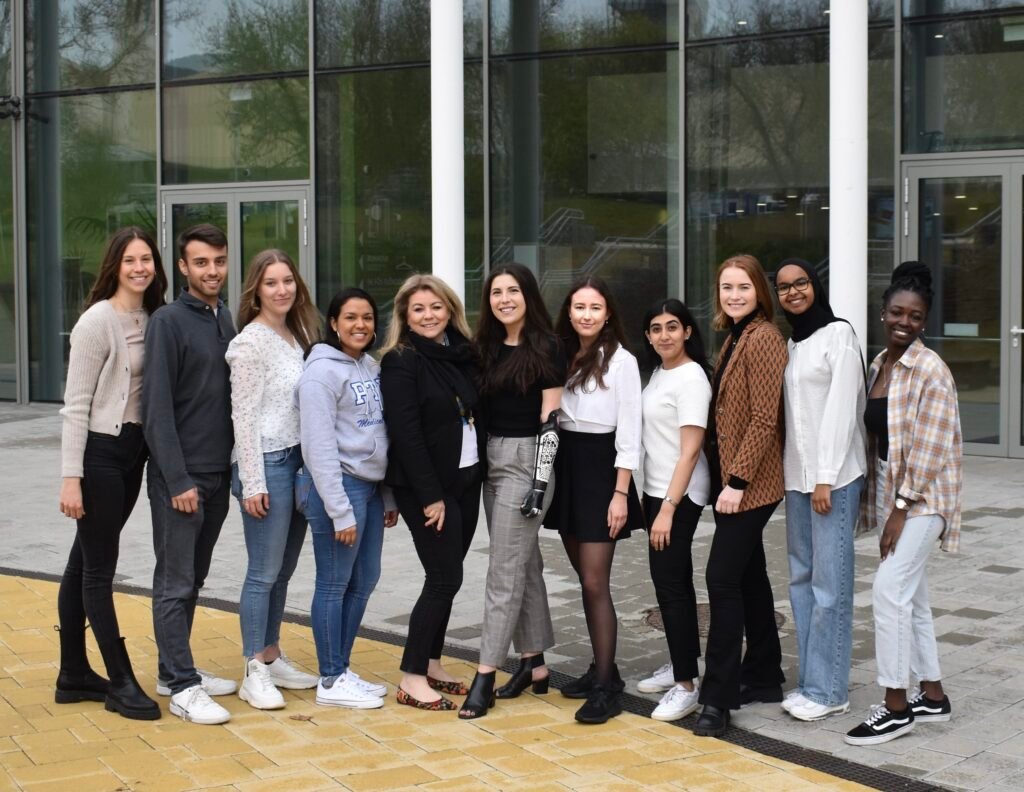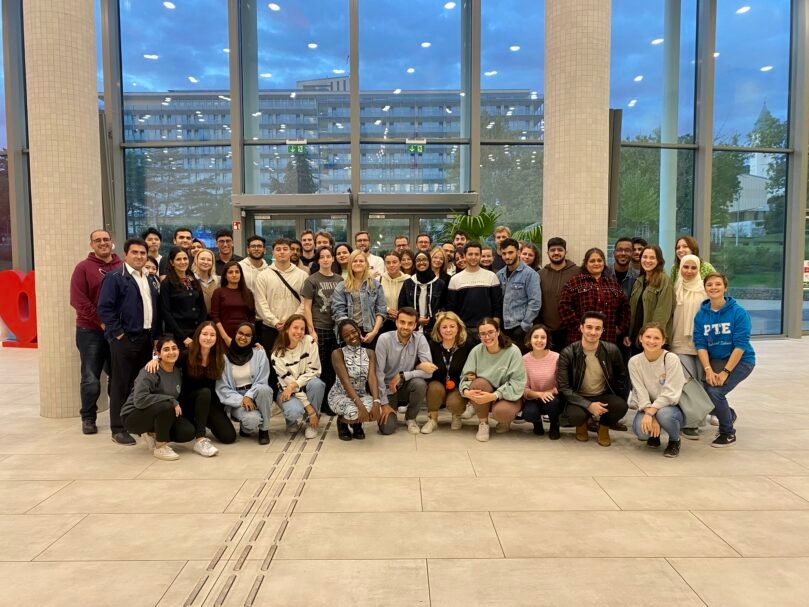Today’s about our favourite student body, EGSC!
I’m genuinely excited to discuss the EGSC because it’s a topic that tends to spark a lot of debate. Everyone seems to have an opinion about what’s going wrong or what needs to change within the council.
Personally speaking, my two years in EGSC were among the most dynamic and challenging experiences of my extracurricular journey, yet they proved to be the most rewarding. By the end of this piece, I hope you’ll see why joining them is a decision worth making.

So what’s EGSC anyway?
EGSC is the student representative body in ÁOK for the English and German programs. This covers the medical school students and- surprise, the pharmacy students! Yes pharmacy students, you are absolutely entitled to be a part of this body.
And what do they do?
Their main role is to act as a liaison between the university and the students. They address student issues- academic and personal, conveying them when necessary to the appropriate authorities and finding a solution for the student body. And as you may know by now, there’s the event organisation: the White Coat ceremony, Tea & Talk, International Evening, Motivational Speech, amongst others.
A little bit about my experience.
I was in EGSC for 2 academic years serving in the capacity of PR rep. At the time, there was a concern that this role would not be able to be filled because of how skill and time-demanding it is but a good friend who knew about some of my hobbies thought I could be useful in PR and urged me to apply. I applied and just as was thought, I was the only PR applicant. I fell into the role quickly and essentially hit the ground running. In that time, I had to make social media posts and event posters. I had to learn how to optimise images for certain displays and even some video editing was required here and there. I made myself available to attend most (if not all) EGSC events for media purposes. It took a bunch of my time and I had to learn how to manage my schedule and balance the duties with academics. Sometimes the two overlapped but that was okay because I thoroughly enjoyed it. As it turns out, walking past a poster in uni that you spent 2 hours working on the night before gives you a dopamine rush.
As a member of the board, I also had to participate in board activities. These ranged from organising the new white coats for the new 3rd years or taking the new students around the campus during orientation to having meetings with faculty or guiding a student on how to set up and access Amboss.
There was also critique- hardly ever in person- just online. Because EGSC acts as a representative body for the students, they are also the first line of attack when students do not necessarily get the outcomes they desire. In truth, a student body is also limited in many ways and this one does the best with what they have. It was never taken personally, even the nasty digs, and we just did the best we could as a team. I still recognise it as one of my best moments in PTE. I encourage any student to apply and be able to contribute to the student body.

Who can join EGSC?
All active students of the Medical school or Faculty of Pharmacy are eligible to apply. Just as a side note, presidential applicants should either have been an EGSC member for a year already or been a year representative for 2 years.
EGSC members of the previous board who would like to continue in the following year also have to re-apply, so all positions are really open to any student.
Can first-year students join?
Technically, you can. There’s nothing stopping you but I really would not advise joining EGSC in your first year. First year is such a fundamental year where you are trying to find your footing. EGSC activities require anticipating certain situations and planning ahead a lot. This can be a bit difficult to conceptualise if you do not have a first-hand idea of what’s going on. It’s been done before, don’t get me wrong but I think you put yourself and your academic goals at a disadvantage volunteering in such a big way in your first year.
What posts are available in EGSC?
- President and VP positions (2 each for the English and German programme): They primarily handle executive roles, delegation duties and academic concerns. They are often in closest contact with university leadership. If you have an eye on this role, you need to come with charm and charisma. You need to have good communication skills and be quick-thinking. Most importantly, you should know how to advocate for your fellow students.
- Communication contacts (2 for the English and German programme): They are in charge of all things communication- emails, social media, etc. They also create the What’s Up in Pécs posts, keeping students abreast of planned events in Pécs. I would say if you have your eye on this role, you have strong organisational skills, time management and, of course a strong command in whatever language you are studying in. Emails are not sent only in response to students, but also to faculty leadership, external bodies, guests of the university, etc.
- Dentistry representative: This role is reserved for a student from the dentistry programme who can advocate for the dentistry students. This role is relatively new and was introduced to bring the board’s attention to any issues faced by students in the dentistry programme. You will need to be an advocate for students where you see dentistry students not receiving as much support or help. The role as introduced when it was observed that the board was overwhelming full of GM students who did not have as much knowledge of the goings-on in the other programmes. It is a dream that it would one day be redundant, but till then…
- Pharmacy representative: Similarly, this role is reserved for a student from the pharmacy programme who can advocate for GYTK students. The role is the same as that of the dentistry rep.
- PR representative: This role is not language or programme-specific. This role can be quite time-demanding, speaking from experience. The PR rep makes the pretty social media posts and the posters that go up in the university and are flashed on the monitors in the university. Around the time of events, even more work is required in the position. If you have an eye on this role, it’s imperative that you can read and summarise large bits of information to smaller bullet points. You should have an eye for detail and basic design skills. You will need to use certain design programmes like Canva, Adobe Illustrator, even some video editing programmes (iMovie, Final Cut pro,) etc.
- Secretary: This role is not language or programme-specific. If you have your eye on this role, you should also have strong organisational skills and time management. You will be required to make agendas, plan meetings and take minutes of internal and external meetings and sometimes assist with task allocation.
- Treasurer: Also not language or programme-specific. This role was once in charge of financial duties. Due to a change in how financial responsibilities are handled, the role is now more of a miscellaneous role, assisting the other members in their roles, especially PR as it can be quite time-consuming. So it is beneficial to have a similar profile as PR and even communications contact.
How can I join EGSC?
A call for applications will be put out, typically in the first 2 weeks of the new academic year (so anytime now). Usually a CV and a motivation letter is requested and then all you have to do is wait for the elections.
What does the election process look like?
As far as I know, it has always been an electoral process conducted by the group leaders and year representatives. Candidates for each position are asked to prepare a small campaign speech and pitch themselves, after which the attendees (group leaders and year reps) vote. Votes are counted and the new board is announced shortly after the voting process is done.
I will add that I am not so much a fan of this method as it can quickly become a popularity contest. But I got to understand that there is an obligation for EGSC to open up voting to representatives of the student population- that being the year reps and group leaders, rather than internally conducted interviews for the sake of transparency.
What are the perks?
EGSC offers multiple opportunities to develop essential soft skills like leadership, time management (I never needed a planner till I joined!), teamwork, communication, and conflict-resolution- skills that are valuable in both social and professional settings.
You also have the chance to make a difference, even in small ways. EGSC runs an open-door, walk-in service service throughout the academic year, where students come in with a variety of concerns. Depending on the issue, you could help by simply offering a listening ear and a supportive hug, or by taking more involved actions like accompanying them to the registrar’s office or sending an email on their behalf.
Another rewarding aspect is being part of the behind-the-scenes work for some of our most popular events. Watching weeks of preparation come to life from the ground up gave me a deeper appreciation for the relationship between hard work and tangible results.
Working with students from different programs also exposes you to the inner workings of the educational systems within PTE and widens your understanding.
Lastly, being an EGSC member can boost your Erasmus or POE exchange program applications, giving you an edge with extra points for participation.
Any cons?
One downside is the time commitment, which varies depending on your role. Some positions require more time than others, but all roles can become demanding. Even members with lighter duties often step in to support others when the workload becomes overwhelming.
A common question asked by students is whether EGSC is a paid extracurricular. To the best of my knowledge, up till now there is no remuneration for EGSC members. This is intentional, to attract those with genuine passion and drive to make a difference, rather than those motivated solely by financial incentives.
Even so, none of these are peculiar to EGSC and many of our extracurriculars have similar cons. There’s a lot more to benefit than lose by joining EGSC.
This brings us to the end of the piece. Keep your eyes peeled for the Call-for-Applications on EGSC’s Facebook and Instagram pages. I hope everything has been clearly explained, and I trust that when the application period opens, there will be a few more enthusiastic applications coming through.
Stay safe!
EDIT: Applications are currently open until 22nd September. Send your CV and motivation letter to egsc[at]aok[dot]pte[dot]hu. This year, not all positions are open so check the listing here to see what you might qualify for.
Author’s note: The views and opinions expressed in this piece are solely my own and do not represent those of any institution. Any conclusions drawn or interpretations made are personal and should not be attributed to any entity other than myself.

Do you receive a certificate at the end of the year if your an egsc member ?
Yes, great question. You will receive a certificate as well 😀